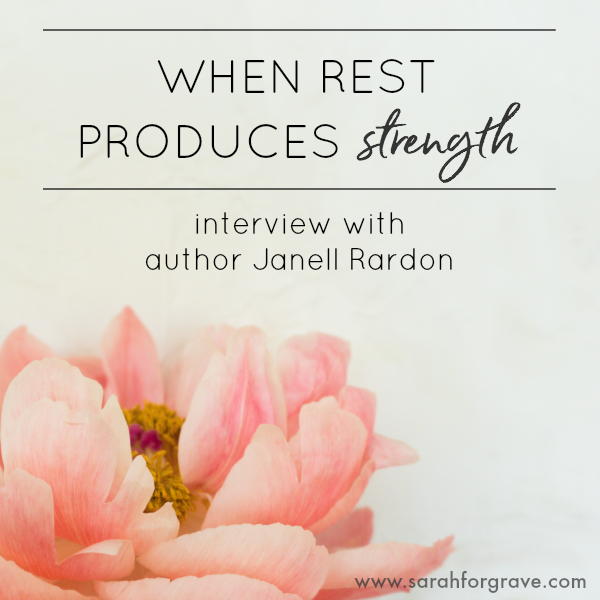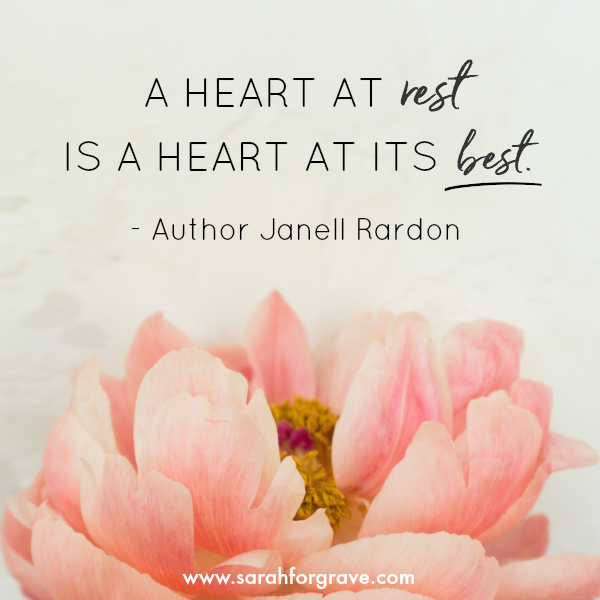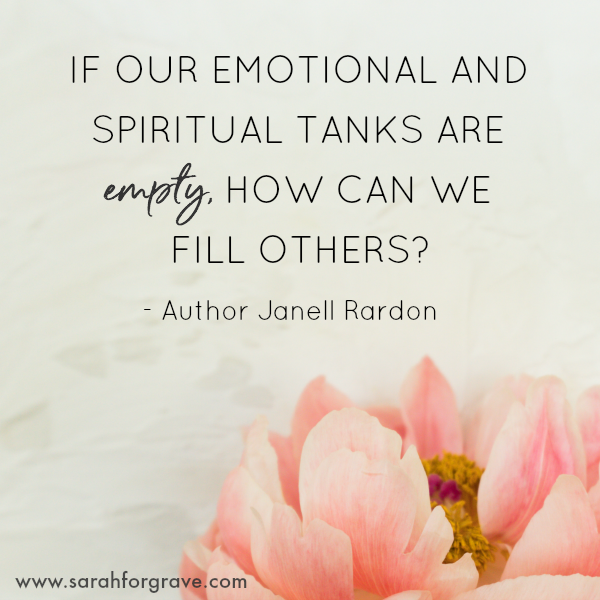I’m thrilled to introduce you to my friend Janell Rardon today. Her book, Overcoming Hurtful Words, is a worthwhile read for many reasons: (1) Janell’s writing is vibrant and empowering. (2) The book is real and honest. (3) It draws from a solid Scriptural foundation, and (4) It offers practical life coaching tools that will empower you in every area of life.
Today I’m interviewing Janell to explore one of the topics in her book — collecting strength. She offers a unique perspective that turns the definition of strength upside down. As someone coming off of an overcommitted season, I found great freedom and release in her message!
If you struggle with the desire to be strong, capable, and enough, keep reading and be inspired…
Welcome, Janell! First, I’d love to hear what motivated you to write your book, Overcoming Hurtful Words. Did it come out of personal experiences or general observations…or a little of both?
Sincerely, I was initially motivated by a debilitating grief over the way women treat one another—especially women of faith. Yes, my expectations were higher, as I believe women who profess faith in Christ, albeit human and imperfect, are called to live a life worthy of this calling—myself at the front of the line. And then, after a deeply personal, crushing experience, in which hurtful words from a fellow female leader cut me to the core, I faced a serious emotional and spiritual crisis.
This altercation merely served as the tipping point and confronted many unhealthy behaviors and patterns that needed to be addressed in my life. As I worked out my angst on my blog and within the hallowed pages of my journal and daily listened to the heart-wrenching stories from the hearts of my clients, Overcoming Hurtful Words was born.
In your book, you share 9 practices to help us overcome hurtful words and rewrite our stories. In the fifth practice, you refer to rest as collecting strength. How are these two concepts interrelated?
An a-ha moment came to me as I was studying and preparing for an upcoming eCourse I was developing. As I read and then began researching on Matthew 11:28-30, I discovered a deeper meaning to the verb, rest. In the Greek, rest, anapauo, is defined, “To cause or permit one to cease from any movement or labour in order to recover and collect strength.”
I distinctly remember gasping as I read the latter part of that definition. In order to recover or collect strength. Prior to reading this, I equated rest with getting a massage or going on vacation, but in its truest sense, it simply invites us “to collect strength.”
This looks different for everyone, doesn’t it? And, it doesn’t typically cost any money. I collect strength by riding my bike, beachcombing for moon shells, going to a yoga class, writing in my journal, or setting a beautiful table and making a great meal. Most importantly, this is a daily practice. I concluded that a heart at rest is a heart at its best. Ready to face the day with collected strength, not depletion and strain.
You say we must give ourselves permission to collect strength (i.e., to rest): Why do you feel this is important, that we give ourselves permission?
Perhaps I needed to give myself permission. But then through the years, I realized I am not alone in this. I’ve listened to countless women, in my private practice, in my friendships, and in conference settings, speak from a place of total emotional exhaustion. Phrases like, “I am done,” and “I can’t take anymore,” and “Why can’t I handle it all?” repeatedly being voiced.
In a culture that beats to the drum of “more, more, more,” rest is often interpreted as selfish or unnecessary. Take vitamins. Work out. Get organized. “Do” this and that. When we give ourselves permission to collect strength, we move through life from a healthy place and at a healthy pace. Fractured and frazzled becomes calm and collected. Hurry and scurry becomes well-balanced and centered.
Your book stresses the importance of “alone time”—times of solitude, in which we can address the issues of self-care and self-preservation. You comment that without those times, you are really no good to anyone. Would you explain what you mean by self-care and self-preservation?
Through this arduous healing journey, I’ve learned a valuable lesson. I can’t do it all, nor have I been called to do it all. I’ve also discovered I am highly allergic to “should-ing” and “shaming” language. We are really good at should-ing all over one another. A kissing cousin to judgment, should-ing is a heavy burden on its recipient. You should learn to say no. You should be at this and that. You should call me more often. You should get organized.
With painstaking care and heartfelt personal examination, and a great deal of prayer and study, I saw over and over again how Jesus made it His highest priority to spend time with His Father. With throngs of people constantly seeking His help, He slipped away to seek solitude. He modeled “self-care,” and “self-preservation,” for us. He knew He had to connect to the most important relationship in His life, collect strength by being in a quiet place, and attune Himself to His Father’s business.
If our emotional and spiritual tanks are empty, how can we fill others? Without a doubt, I can tell when I have neglected this practice. My words are sharper. I have a shorter fuse. My relationships suffer. I grumble and complain. And, grace is replaced with shame and should. Often, I get physically sick.
Amen! I’ve discovered the same in my own life. So now the question many of us are wondering… How can we find solitude in our busy agendas?
Oh, the badge of busy. We wear it loud and proud. Mine had lights and bells and whistles. Nothing gave me more self-satisfaction than wearing that accolade. Until, I fell apart. Literally came apart at the emotional seams.
If I could, I’d wave my magic wand over each and every person in the world and instantly allow them to experience the profound treasures of practicing silence and solitude, but I can’t. It requires intentionality and discipline. Yikes, the “D” word. Busyness isn’t going away, but it can be managed. I don’t promise easy, but I do promise empowering.
One of the simplest ways to find solitude is to make room for it to happen. When I first began my own journey into this practice, I sat in my master bedroom closet. In the dark. I was so worn out that I had no words left, only, “Help me, God.” I call this my “three-word whisper prayer.”
By making room, we invite God into a quiet place—our hearts—and begin connecting. One minute will turn into two and before you know it, your soul’s craving for peace and rest is satisfied. Silence is no longer a stranger but your very best friend. Someone you can’t live without.
I love that, Janell! It’s not always easy to seek out solitude, but once you experience its power, you’ll never want to turn back. Thank you so much for being my guest today and inspiring us toward heart change!
Blog friends, to learn more about Janell and her book, keep scrolling…
ABOUT JANELL
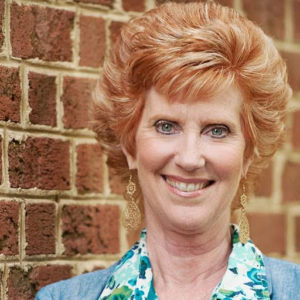 Janell Rardon, national and international speaker, author, and relationship expert, has a master’s degree in Human Services Counseling/Marriage and Family Specialization. A board-certified Advanced Christian Life Coach (AACC), she is in private practice in Suffolk, Virginia. Janell and her husband have three grown children. As a faith leader, Janell’s passion is to help women and their families activate the three-fold cord of emotional health and spiritual maturity in their lives and homes. When this happens, the world is a healthier place to be. Find out more at OvercomingHurtfulWords.com and JanellRardon.com.
Janell Rardon, national and international speaker, author, and relationship expert, has a master’s degree in Human Services Counseling/Marriage and Family Specialization. A board-certified Advanced Christian Life Coach (AACC), she is in private practice in Suffolk, Virginia. Janell and her husband have three grown children. As a faith leader, Janell’s passion is to help women and their families activate the three-fold cord of emotional health and spiritual maturity in their lives and homes. When this happens, the world is a healthier place to be. Find out more at OvercomingHurtfulWords.com and JanellRardon.com.
Connect with Janell and The Speak Healing Words Community:
FB: www.facebook.com/JanellRardonAuthor
Instagram: https://www.instagram.com/janellrardon/
Twitter: https://twitter.com/janellrardon
LinkedIn: https://www.linkedin.com/in/janellrardon/
ABOUT OVERCOMING HURTFUL WORDS
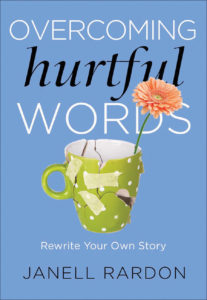 Hurtful words can steal joy, distort truth, and create long-term struggles with understanding your worth and purpose. In this powerful new book, counselor and life coach Janell Rardon, MA, equips you to address and reframe negative words and labels that have hurt you in order to achieve healing and lasting freedom. By understanding and embracing your God-created identity, you will develop a healthy sense of self and build a foundation for lasting, positive relationships. Using Scripture along with tested and proven techniques, you can exchange unhealthy beliefs and behaviors for a new, joy-filled life.
Hurtful words can steal joy, distort truth, and create long-term struggles with understanding your worth and purpose. In this powerful new book, counselor and life coach Janell Rardon, MA, equips you to address and reframe negative words and labels that have hurt you in order to achieve healing and lasting freedom. By understanding and embracing your God-created identity, you will develop a healthy sense of self and build a foundation for lasting, positive relationships. Using Scripture along with tested and proven techniques, you can exchange unhealthy beliefs and behaviors for a new, joy-filled life.
*flower photo by Wander & Rose / CreativeMarket.com
